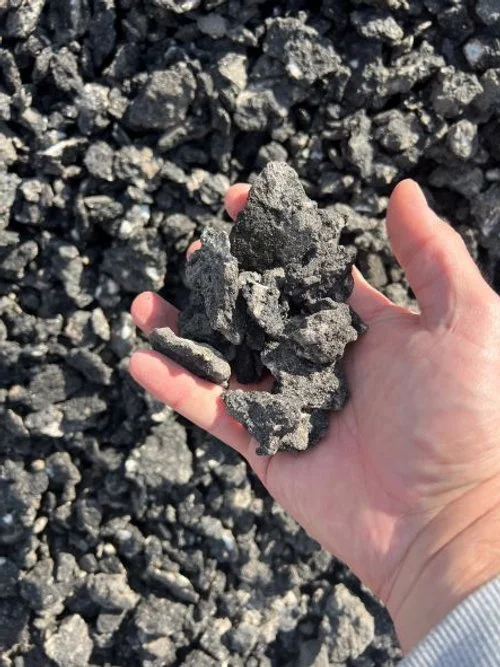How Much Recycled Crusher Run Do I Need?
Assumes Recycled Crusher Run ≈ 23 ft³ per ton (slightly lighter than virgin). Coverage varies with moisture & compaction.
Sales tax (varies by county) is added at checkout.
About Recycled Crusher Run
Recycled Crusher Run is produced from crushed concrete, asphalt, and reclaimed stone. It has the same angular stone and fines mixture as virgin crusher run, which allows for excellent compaction into a stable base.
The difference is sustainability: recycled aggregate diverts construction debris from landfills and reduces the demand for new quarry rock.
Because it comes from concrete and asphalt, customers should expect occasional small wire fragments or minor impurities. Screening removes most debris, but some pieces can pass through. These are generally harmless and can be picked out during installation.
Another difference is density. Recycled aggregates are lighter than pure granite, so each ton covers slightly more area than virgin crusher run.
Local Applications – Recycled Crusher Run (Upstate SC)
Driveways & Access Roads: Compacts into a durable surface that resists rutting in the clay-heavy soils common across Spartanburg and Greenville counties.
Farm & Equipment Yards: Provides a stable pad that withstands tractor and loader traffic without pumping or shifting under weight.
Parking Pads (RVs, Trailers, Machinery): Creates a solid, compactable base that supports heavy parked equipment and vehicles.
Shed & Outbuilding Foundations: Used as a sub-base under sheds or shops to prevent settling and improve load distribution.
Sub-Base for Asphalt or Pavers: Frequently used by contractors before asphalt paving or as a base under pavers for walkways and patios.
Temporary Construction Roads: Cost-effective choice for haul roads and job site access where virgin crusher run is not required.
Coverage & Density – Recycled Crusher Run
Density: ~22–24 cubic feet per ton (slightly lighter than virgin granite)
Coverage: ~75–80 sq ft/ton at 4″ depth; ~50–55 sq ft/ton at 6″ depth (after compaction)
Comparison to Other Materials
Virgin Crusher Run: Heavier granite-based aggregate with the same fines mixture; stronger and more uniform but more expensive.
#57 Stone: Better drainage but does not compact; often used as a top layer over Crusher Run.
River Sand: Free-draining fill for septic systems or arenas; not a substitute for a compactable base.
Rip Rap / Surge Stone: Large stabilization rock for erosion control, not used as compactable base.
Local Performance – Recycled Crusher Run in Upstate SC
Driveways in Clay Soils: Performs well when installed over geotextile fabric to prevent mixing with clay subgrade.
Farm & Equipment Yards: Holds up under tractor and loader traffic while saving costs compared to virgin crusher run.
Residential Pads: Provides a strong sub-base for sheds and small structures across Spartanburg and Greenville.
Contractor Use: Common for temporary haul roads and site prep due to lower price point.
FAQ – Recycled Crusher Run (Upstate South Carolina)
What is Recycled Crusher Run made from?
Crushed concrete, asphalt, and reclaimed stone mixed with fines.
How does it compare to Virgin Crusher Run?
It performs similarly in compaction and strength, but may contain small wire fragments or minor debris. See Virgin Crusher Run.
Does it contain wire or rebar?
Occasionally. Small wire pieces from reinforced concrete can pass through screening.
What sizes are included?
1½″ stone down to fines, just like standard crusher run.
Is it cheaper than Virgin Crusher Run?
Yes. It is less expensive and eco-friendly. See Virgin Crusher Run for comparison.
Does Recycled Crusher Run compact as well?
Yes. The fines allow dense compaction under load, similar to virgin crusher run.
Does it have more volume per ton?
Yes. Because recycled concrete and asphalt are lighter than granite, each ton covers slightly more area.
Can it be used for driveways?
Yes. It is a common choice for residential driveways and farm access roads. See #57 Stone for top-dressing option.
Is it good for drainage?
No. It compacts too tightly. For drainage, use #57 Stone or River Sand.
Can it be used under pavers or patios?
Yes. It forms a strong base. Some customers add a leveling layer of Screenings.
What is the coverage per ton?
~75–80 sq ft/ton at 4″, ~50–55 sq ft/ton at 6″ depth.
Can it be tailgate spread?
Yes, though material flow may be uneven due to mixed content.
Is there a minimum delivery?
Yes. 1 ton minimum. Free delivery at 15+ tons.
Will it support heavy trucks or equipment?
Yes. It is used for construction pads and farm equipment yards.
Can weeds grow through it?
Unlikely due to its dense compaction.
How long does it last?
With proper depth and maintenance, it can last for years.
Can it be used in ditches or for erosion control?
No. For water flow, use Class A Rip Rap or Surge Stone.
Is it safe for asphalt or concrete base?
Yes. It is often used as a base before paving.
What about color?
It may vary. Expect brown/gray tones with bits of asphalt or concrete.
Do I need to be home for delivery?
Not required if access and instructions are provided.
How heavy is a tri-axle load?
Approximately 20–22 tons per truck.
Disclaimer
Natural and recycled products vary in size, color, and texture. Quantities are approximate. Recycled aggregates may contain small wire fragments, asphalt, or concrete pieces. See our Disclaimer & Terms of Delivery page for full details.






